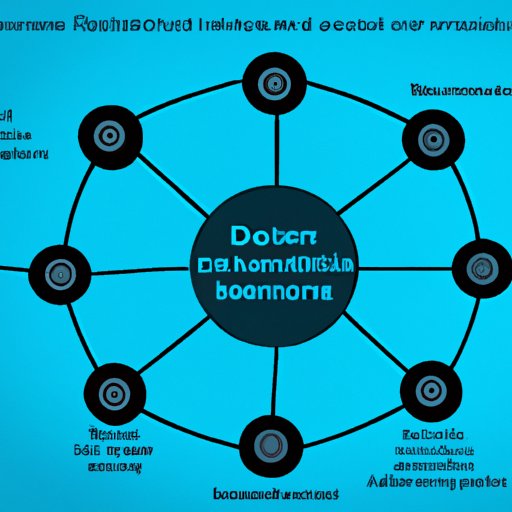Introduction
Blockchain technology is an innovative form of distributed ledger technology that has the potential to revolutionize many industries. It is praised for its security, transparency, and immutability, which are all key components of what makes it so useful. But what exactly makes blockchain secure? This article will explore this question by looking at the cryptography underlying the technology, the benefits of decentralization, the role of consensus algorithms, the potential of smart contracts, and the implications of quantum computing.

Exploring the Cryptography Underlying Blockchain Technology
Cryptography is a branch of mathematics that deals with the study of codes and their applications. It is often used to protect sensitive information such as passwords and financial data from unauthorized access. In the context of blockchain technology, cryptography is used to ensure the integrity and security of the data stored in the blockchain.
Cryptography works by using complex mathematical algorithms to encrypt data. These algorithms create a digital signature or “hash” that can be used to verify the authenticity of the data. The hash is also used to create a public/private key pair, which enables users to securely sign transactions and store data on the blockchain.
Cryptography is essential for ensuring the security of blockchain technology. Without it, malicious actors could easily alter the data stored on the blockchain, leading to potentially disastrous consequences. By using cryptography, blockchain technology can ensure the integrity of the data stored on the network, making it much more secure.

The Benefits of Decentralization for Security
Decentralization is one of the core principles of blockchain technology. It refers to the fact that the data stored on the blockchain is not stored in one central location, but rather is spread across a network of computers. This decentralized architecture provides several advantages when it comes to security.
One of the main benefits of decentralization is that it eliminates the need for a single point of failure. Since the data is not stored in one place, it is much harder for a malicious actor to gain access to it. Additionally, since the data is spread across a network of computers, it is much more difficult for a hacker to modify or delete it without being detected.
Decentralization also helps to ensure the integrity of the data stored on the blockchain. Since each node in the network stores a copy of the data, any attempts to alter the data would have to be made on every node in the network. This makes it virtually impossible for a malicious actor to manipulate the data stored on the blockchain.
Examining the Role of Consensus Algorithms in Blockchain Security
Consensus algorithms are another important component of blockchain technology. They are used to ensure that the data stored on the blockchain is valid and accurate. Every time a new block is added to the chain, the consensus algorithm will verify the data to ensure that it is correct and that it has not been tampered with.
There are several different types of consensus algorithms, including Proof of Work (PoW), Proof of Stake (PoS), and Delegated Proof of Stake (DPoS). Each type of consensus algorithm has its own set of rules and mechanisms for verifying the data stored on the blockchain, but they all work towards the same goal: ensuring the integrity of the data stored on the blockchain.
By using consensus algorithms, blockchain technology can ensure that only valid and accurate data is stored on the network. This helps to reduce the risk of malicious actors manipulating the data stored on the blockchain, making it much more secure.

Looking at Smart Contracts and their Impact on Security
Smart contracts are self-executing contracts that are written in code and stored on the blockchain. They are used to facilitate transactions and agreements between parties without the need for a third party intermediary. Smart contracts are powered by blockchain technology, which makes them highly secure.
Smart contracts use a combination of cryptography and consensus algorithms to ensure the accuracy and integrity of the data stored on the blockchain. This ensures that the terms of the contract cannot be changed or manipulated without the consent of all parties involved. Additionally, since smart contracts are stored on the blockchain, they are immutable, meaning that they cannot be altered or deleted once they have been executed.
Smart contracts can help to improve the security of blockchain technology by ensuring that the data stored on the blockchain is accurate and secure. This makes it much harder for malicious actors to manipulate the data stored on the blockchain, making it more secure.
Analyzing the Potential of Quantum Computing and its Implications for Blockchain Security
Quantum computing is a new type of computing technology that uses the principles of quantum mechanics to process data. It has the potential to revolutionize many industries, including blockchain technology. While quantum computing could offer many benefits, it also poses a threat to the security of blockchain technology.
Quantum computers are capable of performing calculations much faster than traditional computers. This means that they could potentially be used to crack the cryptographic algorithms used to secure blockchain networks. Additionally, quantum computers could also be used to mine blocks at a much faster rate, allowing malicious actors to gain control of the network.
While quantum computing poses a threat to blockchain security, there are also solutions being developed to address this issue. For example, some researchers are working on developing post-quantum cryptographic algorithms that are resistant to attack from quantum computers. Additionally, some blockchain projects are implementing other security measures such as sharding and checkpointing to further protect the network.
Conclusion
This article has explored what makes blockchain secure by looking at the cryptography underlying the technology, the benefits of decentralization, the role of consensus algorithms, the potential of smart contracts, and the implications of quantum computing. Cryptography is essential for ensuring the security of blockchain technology, while decentralization helps to eliminate the need for a single point of failure. Consensus algorithms are used to ensure the accuracy and integrity of the data stored on the blockchain, while smart contracts provide an additional layer of security. Finally, quantum computing poses a threat to the security of blockchain technology, but solutions are being developed to address this issue.
Overall, blockchain technology is a secure and reliable way to store and transact data. By understanding the cryptography, decentralization, consensus algorithms, smart contracts, and quantum computing underlying the technology, we can better understand how it is able to provide such a high level of security.
(Note: Is this article not meeting your expectations? Do you have knowledge or insights to share? Unlock new opportunities and expand your reach by joining our authors team. Click Registration to join us and share your expertise with our readers.)
